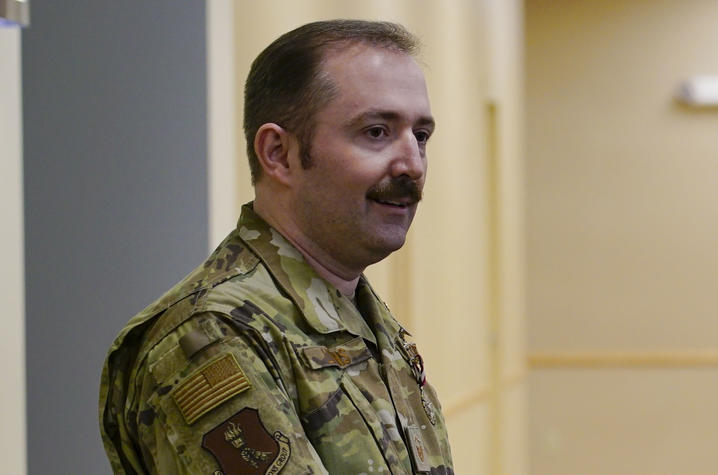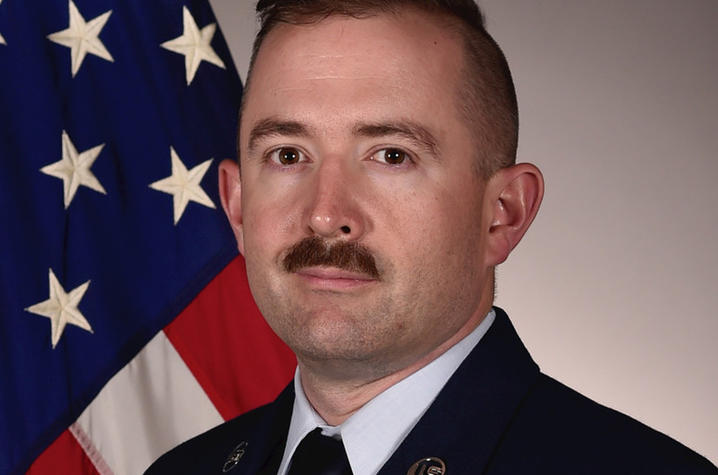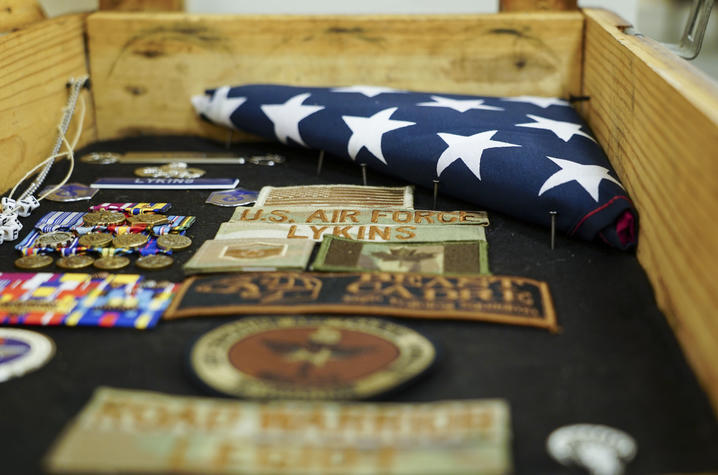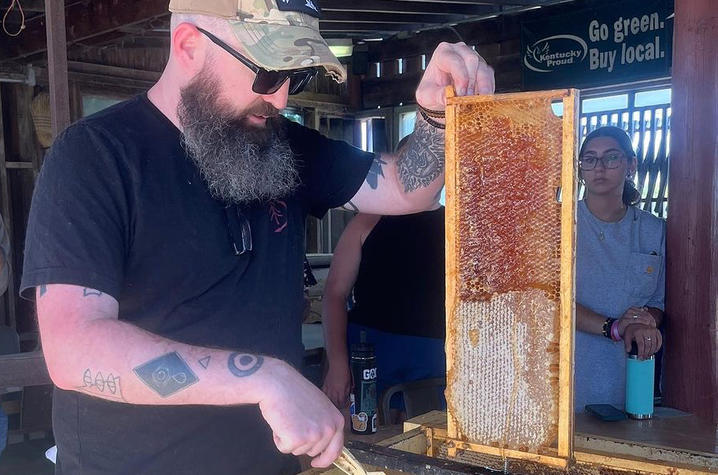Student veteran returns to his agricultural roots at UK
Today, the University of Kentucky is celebrating and honoring all veterans, including those who are students, employees and alumni of UK. At the Veteran's Resource Center (VRC), we proudly support a wide-ranging community, encompassing not only veterans but also their family members. The VRC is a vital hub for these extraordinary individuals to come together, share their unique life experiences and access a comprehensive array of resources and support. Our primary mission is to empower our military-connected students to pursue and achieve their desired careers. We are committed to providing the tools, guidance and opportunities they need to successfully transition to civilian life and excel in their chosen fields. Together, we aim to foster a thriving community that not only values their diverse backgrounds and experiences but also helps them realize their full potential and make a lasting impact in the world beyond their military service.
The Veterans Resource Center and the entire UK community would like to thank all veterans for their service and sacrifice for the U.S.A.
LEXINGTON, Ky. (Nov. 10, 2023) — On the continuum of beards, Brad Lykins’ sits somewhere between mid-aughts hipster-chic and ZZ Top.
Since retiring from the United States Air Force with the rank of master sergeant two and a half years ago, Lykins’ appearance has transformed from the closely shaven, meticulously mustachioed look that his students and fellow wingmen recall.
“Yeah, I definitely decided to relax my look a little,” Lykins laughs of his laid-back approach to life after retirement, all the while stroking the grizzled hair eclipsing his jawline. “I hated having to wake up and shave every single day. My goal was originally to grow a beard and not cut my hair, but my hair drove me crazy.”
Although temporarily sidelined from his interests in yoga, hiking, marathon running and rucking due to a recent surgery, Lykins, at 40 and with his hair freshly shorn, refuses to succumb to the idea of retirement slowing him down. Electing to forego promising opportunities in lucrative aerospace and supply chain strategy careers following his military service, Lykins made the decision in 2021 to rekindle his connection with nature and his farming roots by enrolling in the University of Kentucky’s Martin-Gatton College of Agriculture, Food and Environment.
A nontraditional, first-generation college student, Lykins grew up among the fragrant green and amber fields of America’s tobacco belt. Growing up money was tight. At age 17, Lykins joined the Air Force after graduating from Garrard County High School. He viewed the six-year enlistment not only as a means to finance his college dreams but also as an opportunity to instill discipline in his life.
“I knew that I needed structure and that’s what made me enlist,” explains Lykins. “Going in, my recruiters said things like ‘We never go to war.’ My original plan was that I’d enlist and just be done after six years. I was going to come back to Kentucky and pursue my education. Obviously, it didn’t turn out exactly that way.”
Lykins enlisted in June 2001, less than three months before the 9/11 terrorist attacks in New York and Washington, D.C. He was subsequently deployed five times: twice to Afghanistan in 2002, to Iraq in 2003 and 2004, and to the United Arab Emirates in 2006 to support Operation Iraqi Freedom.
The anticipated six years turned into two decades. Lykins’ Air Force career spanned military sciences and technology, aviation technology and education. His last role was as chief quality assurance inspector for the Air Force’s fleet of RQ-4 Global Hawk autonomous surveillance aircraft.
While enlisted, he earned a bachelor’s degree in workforce education and development from Southern Illinois University in Carbondale, as well as three associate’s degrees from the Community College of the Air Force.
“I enjoyed working on aircraft,” Lykins explains. “I enjoyed the work we did, but at 20 years, I knew that it wasn’t something I wanted to continue to do. I finally had the opportunity to decide what I really wanted from life.”
Seeking structure reminiscent of his Air Force career and not wanting to become, as he characterizes it, “aimless” in his retirement, Lykins decided to utilize his military benefits to embark on a new life direction.
Through the support of the government’s Post-9/11 GI Bill, Lykins is following his passion for farming and majoring in sustainable agriculture and community food networks with a minor in plant and soil sciences, actively gaining hands-on experience in modern agricultural techniques. He aims to merge his Air Force experience and newfound knowledge to enrich lives in his community.
“Much of my background is in life cycle logistics,” Lykins says. “I now have the opportunity to combine those skills with what I’m learning here at UK into a way to have a local food distribution specifically for the lower Bluegrass area of Boyle, Garrard and Lincoln Counties. Madison County. Mercer County. Those are traditionally poorer areas in the state where access to food remains a huge concern. It isn’t access to calories but access to nutrition that’s the issue and being able to set up some type of nonprofit that can help offset that nutrition deficit in the area — that’s the dream.”
Many of the tobacco fields of Lykins’ youth have since transitioned to more sustainable crops, and he seeks to actively contribute to the movement aimed at safeguarding the environment.
“Growing up, I didn’t really have enough knowledge to understand the ethical dilemmas of that sort of crop,” Lykins says of tobacco, once the predominant crop in Kentucky and one with a large carbon footprint. “It’s bad for people. It’s bad for the soil. I want to be a part of something that provides good food to people as easily and as cheaply as possible in a way that does the least amount of harm to the environment.”
Like an eager explorer, Lykins enthusiastically absorbs farming knowledge that he may never have encountered if not for his time at UK. According to him, one of the most captivating aspects he has discovered in the program revolves around the university’s organic farm.
Describing it as “amazing,” Lykins says the scope and scale of the farm has transformed his perceptions of what it means to be truly organic.
“Without this type of formal education, I don’t think I would’ve ever had the opportunity to be a part of something like this,” Lykins explains. “The hands-on portion — the practical portion of the learning — is just … it’s incredible. You can read about it and write research papers on it and do all that, but until you put your hands in the dirt and really apply it, that makes all the difference in the world.”
Lykins good-naturedly embraces the experience of being in classrooms with students much younger than himself, many of whom are less than half his age.
“I get looked at and it’s assumed I’m faculty or staff or something,” Lykins laughs. “There’ve been times that someone’s handing out pamphlets or invitations to something and I hear, ‘Oh, professors are invited, too!’ I’m on the older end of the millennials and these guys now seem very young. It’s eye-opening to know that, ‘Oh, I’m the old guy now.’”
Despite a perceived “generational divide” mentioned by Lykins, he finds enjoyment in both learning from and collaborating with his younger classmates. Because of his age, he naturally stands out in classes, which makes him less hesitant to participate by voicing his opinions and volunteering for various tasks during lessons. Drawing from his experience teaching recruits, he often invites fellow students to engage more actively alongside him.
In addition to his studies, Lykins has mentored students in the UK ROTC program, believing that this engagement and contribution aids in combating the loss of identity that many military personnel grapple with upon reentering civilian life.
Although he has yet to encounter another military retiree on Lexington’s campus, Lykins is well aware of the considerable number of veterans and active military students who choose to study at UK.
In the 2022-23 academic year, UK had an enrollment of nearly 700 undergraduate and graduate students who were either actively serving or had prior experience in the armed forces. Of these, more than 88% receive some educational benefit from the Veterans Administration.
“Our veterans and military connected students continue to make UK an incredible institution of higher education,” says Tony Colella, assistant vice president of enrollment management, interim director of admission for the Lewis Honors College and a 24-year retiree from the U.S. Air Force. “These amazing students, much like Brad, bring motivation, professionalism, character and fortitude to our campus and are determined to earn a University of Kentucky education. It is our privilege to share in the academic journey with these patriotic professionals.”
Lykins says he knows how fortunate he is to have the Post-9/11 GI Bill to fund his studies and that he does not take it lightly.
“I find myself treating school the same way I treated it while I was in the military,” Lykins explains. “It’s my job. I technically get paid to go to school and they cover my tuition. I know a lot of students don’t have the same opportunity. If I wasn’t taking it seriously, I’d feel as if I’m wasting it. I look at it as if this is my job and I want to do it well.”
As Veterans Day approaches, Lykins says that he does not necessarily consider himself a figure to celebrate.
“I know I’m a veteran; I just don’t necessarily think of myself as a veteran. I’m just Brad. I’ve been around a lot of veterans and I’m very thankful to all those individuals. I’m thankful to all my friends who are still serving and who have served. I look at it as, ‘Well, I did the job. I did the job I was supposed to do, and I tried to do it to the best of my ability.’ It makes me stop and think ‘I feel very honored for the work that I did and the people I worked with.’ I’m very proud. Veterans Day is my time to thank those others.”
Lykins hopes that the public will consider contributing to one of UK’s scholarships for veterans to show their appreciation for those who serve. Despite the generous financial aid many military families receive to attend college, others are still left with the burden of tuition that is often difficult to meet.
“There’s a good majority of the military, either ROTC or enlisted, who don’t come from the best socioeconomic backgrounds,” Lykins explains. “There’s a lot of instability, and it’s one of those things that you feel defines you throughout your life. By being able to give to an organization that can possibly support them, what you’re doing is setting them up for a lifetime. They have the same worries at 19 that you do at 35. 40. 50. 60. They’re worried about money in a lot of cases. There are a lot of lower-income individuals who are worried about food and being able to alleviate that — to be able to help lift that burden off their shoulders — is huge. You’re able to help them focus on becoming a better them.”
In addition to advocating for current and former military personnel, Lykins serves as a role model for his 9-year-old nephew, Raylon, and actively works to promote kindness and care for other living creatures. On his 16-acre farm near Lancaster, he can usually be found studying, tending his garden (in 2023, he harvested corn and potatoes but hopes to plant the “three sisters” — corn, squash and beans — next year) or caring for the dogs in the Big Mutts Dog Rescue organization he co-founded nine years ago while stationed in California.
“It taught me how to be compassionate toward something that can provide nothing to me besides companionship,” he explains. “For me, it was learning that I could be compassionate to toward something that has been discarded, thrown away, forgotten, and to be able to show them love, to help them, to let them know that life isn’t suffering and pain.”
Lykins has another two years to complete his agricultural coursework, providing ample time for his beard to flourish. In the meantime, he explores diverse interests, such as enrolling in a ceramics class driven by curiosity. He takes pride in following his younger sister, Brandi, who graduated with a nursing degree in 2015, to UK.
“Once I saw that the programs UK had really lined up with what I wanted to do, it was a no-brainer,” Lykins enthuses. “I’ll get to call myself a UK grad. Being from Kentucky that means a lot to me.”
To make a donation to one of UK’s veteran scholarships or programs, visit https://uky.networkforgood.com/ and type “veteran” into the search box.
As the state’s flagship, land-grant institution, the University of Kentucky exists to advance the Commonwealth. We do that by preparing the next generation of leaders — placing students at the heart of everything we do — and transforming the lives of Kentuckians through education, research and creative work, service and health care. We pride ourselves on being a catalyst for breakthroughs and a force for healing, a place where ingenuity unfolds. It's all made possible by our people — visionaries, disruptors and pioneers — who make up 200 academic programs, a $476.5 million research and development enterprise and a world-class medical center, all on one campus.








